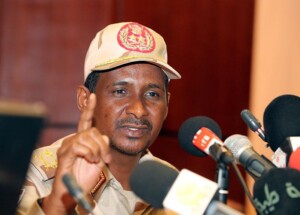Beja Nazirs Council refuses to participate in Eastern Sudan conference
The High Council of Beja Nazirs and Independent Chieftains announced yesterday that it would not attend the Eastern Sudan Conference, which is held in Khartoum today. The Beja Nazirs Council which did not participate in peace negotiations on the Eastern Sudan Track warned, at the same time, of the dire consequences of any political settlement in which not all eastern Sudanese are involved.
 Eastern Sudanese in Kassala (OCHA)
Eastern Sudanese in Kassala (OCHA)
The High Council of Beja Nazirs and Independent Chieftains announced yesterday that it would not attend the Eastern Sudan Conference, which is held in Khartoum today. The Beja Nazirs Council which did not participate in peace negotiations on the Eastern Sudan Track warned, at the same time, of the dire consequences of any political settlement in which not all eastern Sudanese are involved.
Chairman of the Council and Head of the Beja Hadendowa clan Nazir* Sayed Tirik said in a press conference in Khartoum yesterday that “those who lead the conference do not own the land, the geography, and the people”. Therefore, he expected that “the fate of the conference and its recommendations would be the same as the fate of the Eastern Sudan Track”.
"Those who lead the conference do not own the land, the geography, and the people' – Nazir Sayed Tirik
He made it clear that the conference “will not serve peace and security in the community” and called on the government to intervene and prevent any discussion on the future of eastern Sudan before an independent negotiating platform was founded.
Tirik stressed that "the conference does not concern us, we are not a party to it, and we have nothing to do with it, and it will fail as the East track failed".
The nazirs demand an independent negotiating platform, a review of border demarcations, and the arrest of those who caused the strife in eastern Sudan.
Tirik further noted that the Forces for Freedom and Change-National Accord** (FFC-NA) and the Sudan People’s Call support the suspension of the Eastern Sudan Protocol.
Eastern Sudan Conference
Political and civilian parties in eastern Sudan are organising a conference in Khartoum tomorrow to discuss important issues concerning the eastern states of Kassala, Red Sea state, and El Gedaref.
Ibrahim Ismail Jami, head of the committee preparing the conference, told Radio Dabanga on Sunday, the day before the Beja nazirs’ withdrawal, that the conference is being held with the participation of all political parties, movements, civil society organisations, and resistance committees of eastern Sudan.
He explained that the conference will discuss eastern Sudan's participation in national politics, its share of wealth and resources, local and central governance systems, and the optimal exploitation of eastern Sudan's natural resources. He said that the suspension of the peace process caused eastern Sudan to be absent from national politics.
He said that the committee will present a draft political declaration on their visions for governing Sudan at the conference and stressed that all parties from the East participate in the conference, including those who support and reject the Eastern Track.
Eastern Sudan Peace Track
The Eastern Sudan Track Protocol, which is part of the 2020 Juba Peace Agreement, was suspended last year by Deputy-Chair of Sudan’s Sovereignty Council Mohamed Hamdan ‘Hemeti’ Dagalo until a consensus has been reached among the people of eastern Sudan. The suspension was initially meant to only last two weeks.
Earlier this month, the High Council of Beja Nazirs and Independent Chieftains withdrew the file of the peace track from the Sudanese government’s Supreme Committee for Addressing the Situation in Eastern Sudan, also headed by Hemeti.
The Beja nazirs have opposed the Eastern Sudan Track since it was first agreed upon by the Sudanese government and the Sudan Revolutionary Front rebel alliance in the South Sudan capital of Juba in February 2020 as part of the Juba Peace Agreement.
The track was negotiated by the Beja Congress in Opposition and the United Popular Front for Liberation and Justice. The High Council of Beja Nazirs and Independent Chieftains was not involved in the Juba peace talks.

Beja disputes
The Beja are a group of nomadic tribes, occupying mountain country between the Red Sea and the Nile River. Their territory stretches from south-eastern Egypt through Sudan into Eritrea.
Their relationship with the Sudanese authorities is characterised by disputes and protests and they have consistently fought for more rights to self-determination in the region.
When withdrawing the Eastern Sudan Track from the government’s Supreme Committee for Addressing the Situation in Eastern Sudan, headed by Mohamed ‘Hemeti’ Dagalo who is the Deputy-Chair of Sudan’s Sovereignty Council and Commander of the Rapid Support Forces and was involved in the October 25 military coup, the Beja Nazirs called on all eastern Sudanese “to return to the founding platform and to stay away from government officers and donations that belittle the issue of the Beja people”.
They also fear that the rich resources in the east will continue to be exploited by foreign companies.
On August 4, the authorities prevented a political delegation from entering Eritrea to participate in a forum sponsored by Eritrean President Isaias Afwerki to discuss issues in Eastern Sudan.
The delegation included prominent native administration leaders, most notably Nazir Sayed El Amin Tirik and El Ameen Dawoud, head of the Popular Front for Liberation and Justice and a representative of the Nazir of the Beni Amer clan. The delegation also included Mousa Mohamed Ahmed, aide of ousted dictator Omar Al Bashir.
Last month, the High Council of Beja Nazirs and Independent Chieftains warned of the dire consequences of any political settlement in which the eastern Sudanese are not involved. They also highlighted that at least 39 Beja supporters were killed in the past two years of protests against the Eastern Sudan Track.
The Beja nazirs accused Hemeti and his committee of unacceptable interference in eastern issues, practicing divide and rule within the Council, and seeking to abort the Beja revolution in eastern Sudan.
Warnings of conflict
El Ameen Dawoud, who is also a member of the Sudanese Revolutionary Front, also warned of imminent violent conflicts in eastern Sudan.
He told Arabi 21 in an interview published on Monday that “the troubled region is in a state of no war and no peace”.
'The troubled region is in a state of no war and no peace' – El Ameen Dawoud
He said that "the situation in eastern Sudan has reached the stage of complete sabotage of the political and social fabric, an unprecedented collapse of basic services, and the absence of effective governing bodies,” which could lead to serious problems.
Dawoud also noted that "the ongoing conflict in eastern Sudan since 2019 has local, regional, and international dimensions," and called for “addressing the roots of the crisis with priority given to issues of political and economic marginalisation and the looting of resources”.
Regarding the possibility of introducing amendments to the peace agreement signed in Juba, Dawoud said: “the Juba Agreement is neither a Koran nor a Bible, or anything sacred, and therefore can be evaluated and changed”.
* A nazir is a state-appointed administrative chief of a tribe, according to the native administration system in Sudan.
** Last year, a group dominated by members of former rebel movements split off and formed the FFC-National Accord faction. The faction, also known as the National Accord Forces, is chaired by Mubarak Ardol, the former spokesmen for the Sudan People Liberation Movement-North, who became director of the Sudanese Company for Mineral Resources linked with the then-ruling National Congress Party of dictator Omar Al Bashir.











 and then
and then